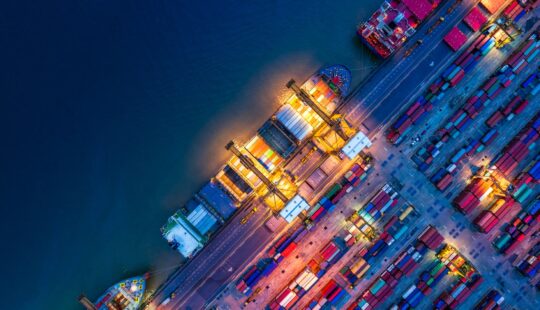The world is experiencing a new, tougher business environment. Trade tensions, wars, climate change, and countless other disruptions are putting the brakes on a long and steady period of globalization. Given this growing uncertainty, companies must reconfigure global supply chains to improve their resilience.
Business leaders might assume that more regulation in such a volatile environment would hinder the innovation they require most at this time. However, we will argue smart and balanced regulation can serve as a catalyst for transformation.
Recent regulatory initiatives like the German Supply Chain Due Diligence Act (LkSG), which mandates human rights and environmental impact due diligence, have positioned Germany at the forefront of ethical standards in supply chains. The draft EU Corporate Sustainability Due Diligence Directive (CSDDD) extends corporate responsibilities in sustainability, while the U.S. Uyghur Forced Labor Prevention Act (UFLPA) places the onus on companies to prove that their products are free of forced labor, shifting the burden of proof to importing entities.
Increased Transparency: Understanding Suppliers’ Suppliers
These and many other emerging regulations play a crucial role in enhancing supply chain resilience. Firstly, they help to increase transparency. Compliance necessitates extensive data collection, providing companies with a clear view of their supply chains, including supplier practices and potential risks. This has been practiced by the pharmaceutical industry for many years due to the potential for damage to human health and economic risk to the company from counterfeits or product quality issues.
Now, more industries are recognizing that transparency across the tiers of a supply chain creates this critical backbone of data and visibility.
Secondly, companies must reassess their sourcing strategies, encouraging diversification and regionalization. This in turn reduces dependency on single suppliers or regions, making supply chains more resilient against unexpected disruptions.
Although companies may have been operating in an interconnected web of global supply chains for decades, those that still do not have full visibility into their own suppliers — and those of their suppliers’ suppliers — are putting themselves at undue risk by not innovating. We call this tier-n visibility. This is an incredibly powerful tool for eventually reducing uncertainty across supply chains.
Enhanced Collaboration: Gaining a Competitive Advantage
Compliance, when well-executed, can lead to stronger relationships with suppliers. The engagement required fosters trust and accountability in the supply chain, resulting in more collaboration to overcome challenges. With diversified sourcing, companies can swiftly adapt their supply chains to ensure business continuity. That’s simply better preparedness.
Researchers at Cambridge University recently emphasized the need to form alliances to enhance economic security through resilient supply chains, advocating for more collaboration to improve resilience and sustainability. Collaborative approaches, supported by digital technologies, can lead to significant benefits, including reduced tax evasion and enhanced information sharing in the global supply network.
But let’s face it: This is an industry problem, not a technology issue. Industries need to change how they use supplier data. Instead of using it to push for better procurement terms through negotiation, they should focus on more collaborative processes.
Many industries are beginning to realize the benefits of such a collaborative approach. For instance, a car company using the open network Catena-X can pinpoint faulty engine parts and trace issues back to the supplier’s supplier. Such a targeted approach minimizes recalls. Catena-X ensures interoperability through common standards, allowing data providers to maintain sovereignty over their data. With 170 international members, including major German car manufacturers, Catena-X is poised to become an industry standard.
In this dynamic environment, supply chain resilience becomes a competitive advantage. Companies that proactively embrace regulatory requirements gain the trust and loyalty of consumers, investors, and stakeholders.
Reduced Risk: Embedding Artificial Intelligence
Growing regulatory demands also require a paradigm shift in how businesses approach risk management within their supply chains. Here is where artificial intelligence (AI) plays a central role.
SAP Business AI solutions can provide proactive insights into the highly complex impacts of potential risks, allowing companies to anticipate and mitigate challenges before they escalate. This transforms the traditional risk assessment process, offering a more dynamic and real-time understanding. And that’s exactly what businesses need now to de-risk.
For example, understanding the impact of new trade sanctions (such as U.S. export controls on advanced computer chips), a container port blockade, or a steep increase on transportation cost for a given shipping lane offers a competitive advantage. Sensing disruptions, simulating them, understanding the impact, and then recommending and executing actions are core use cases that are optimized by AI and machine learning.
However, with powerful technology like AI also comes great responsibility. Ensuring ethical AI development and deployment requires transparency, accountability, and collaboration among businesses, governmental bodies, civil society, and the broader public. The draft EU AI Act would regulate AI systems based on risk levels, emphasizing the importance of adhering to ethical principles to ensure responsible AI use. Trust in AI solutions hinges on the responsible handling of AI technologies and adherence to human rights.
SAP recognized even before any AI regulation was available, that the speed of AI adoption increased the need for the highest ethical standards. SAP was the first European technology company to establish AI guiding principles in 2018 and then created an AI Ethics Policy. The company established an AI Ethics Steering Committee and AI Ethics Advisory Panel, which helps operationalize guiding principles, provides guidance for high-risk use cases. and will align with the upcoming EU AI Act.
Advanced Technologies: Turning Regulatory Burdens into the Foundation for Resilience
Necessity often drives innovation, leading companies to invest in advanced technologies such as supply chain control centers, n-tier visibility, digital twins, cloud solutions, and AI or machine learning. SAP solutions, such as SAP Business Network for Supply Chain Collaboration and SAP Integrated Business Planning for Supply Chain, not only facilitate compliance but also enhance overall supply chain visibility and management.
The best examples of the dynamic application of supply chain technology are often found in the food and beverage sectors, where strict quality controls as well as traceability and safety regulations have long necessitated agile, transparent, and sustainable supply chains. Unilever’s commitment to traceability and transparency in its global palm oil supply chain demonstrates how compliance acts as a transformative force. Nestlé’s embrace of technology illustrates how businesses can enhance transparency, and resiliency, while ensuring compliance with evolving standards. And Grupo Nutresa’s procurement transformation shows how it’s possible to deliver efficiencies and generate more value while doubling down on sustainability with trading partners.
These examples show that compliance and innovation are not mutually exclusive and should be integrated, with sustainability serving as the bedrock of resilient supply chains.
Thomas Saueressig is a member of the Executive Board of SAP SE.
Anahita Thoms is partner and global lead sustainability partner for Industrials, Manufacturing, and Transportation at Baker McKenzie.



